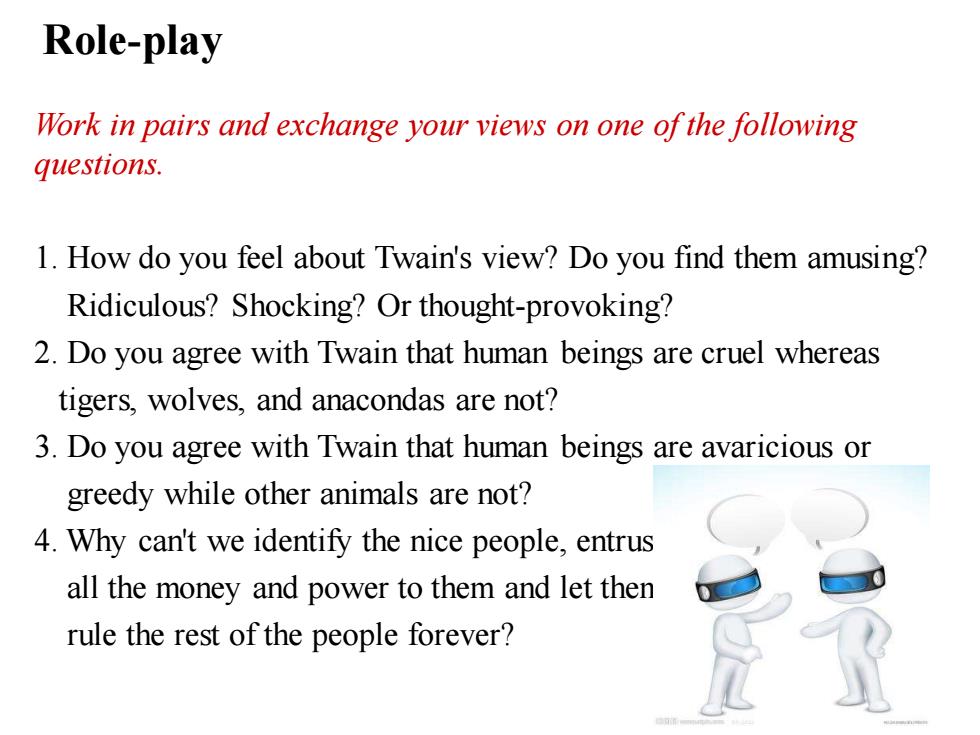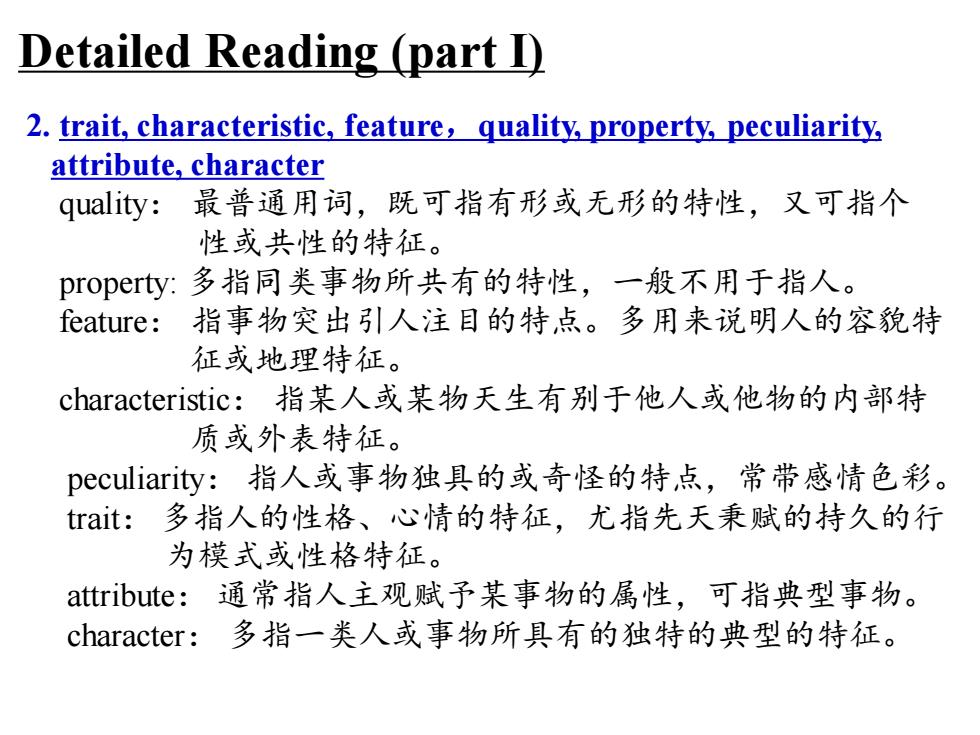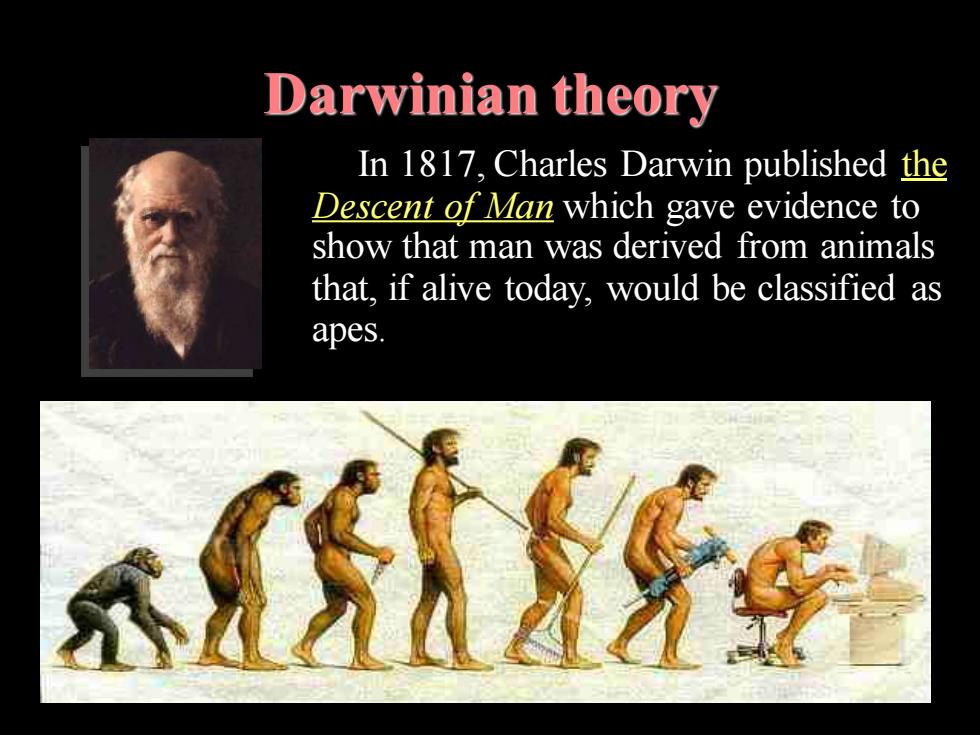
Role-playWork in pairs and exchange your views on one of the followingquestions.1. How do you feel about Twain's view? Do you find them amusing?Ridiculous? Shocking? Or thought-provoking?2. Do you agree with Twain that human beings are cruel whereastigers, wolves, and anacondas are not?3. Do you agree with Twain that human beings are avaricious orgreedy while other animals are not?4. Why can't we identify the nice people, entrusall the money and power to them and let thenrule the rest of the people forever?
Role-play Work in pairs and exchange your views on one of the following questions. 1. How do you feel about Twain's view? Do you find them amusing? Ridiculous? Shocking? Or thought-provoking? 2. Do you agree with Twain that human beings are cruel whereas tigers, wolves, and anacondas are not? 3. Do you agree with Twain that human beings are avaricious or greedy while other animals are not? 4. Why can't we identify the nice people, entrust all the money and power to them and let them rule the rest of the people forever?

Detailed Reading (part I)1. I have been studying the traits and dispositions of the “ loweranimals" , and contrasting them with the traits and dispositionsof man. I find the result humiliating to me. (Para. 1)Question:Why is lower animals put in guotation mark?Read the sentence andpay attention to the tone and diction.(Notice the tongue-in-cheek way/amusing tone( 戏讥) the authorexpresses his ideas. He makes it sound as if he were conducting andreporting on the result of a scientific investigation. In other words, heis deliberately using a pompous(夸大的) style to achieve humor. )
1. I have been studying the traits and dispositions of the “lower animals”, and contrasting them with the traits and dispositions of man. I find the result humiliating to me. (Para. 1) Question: Why is lower animals put in quotation mark?Read the sentence and pay attention to the tone and diction. (Notice the tongue-in-cheek way/amusing tone( 戏谑)the author expresses his ideas. He makes it sound as if he were conducting and reporting on the result of a scientific investigation. In other words, he is deliberately using a pompous(夸大的) style to achieve humor. ) Detailed Reading (part I)

Detailed Reading (part I)2. trait, characteristic, feature, quality, property, peculiarityattribute,characterquality:最普通用词,既可指有形或无形的特性,又可指个性或共性的特征。property:多指同类事物所共有的特性,一般不用于指人。指事物突出引人注目的特点。多用来说明人的容貌特feature:征或地理特征。characteristic:指某人或某物天生有别于他人或他物的内部特质或外表特征。peculiarity:指人或事物独具的或奇怪的特点,常带感情色彩。trait:多指人的性格、心情的特征,尤指先天秉赋的持久的行为模式或性格特征。attribute:通常指人主观赋予某事物的属性,可指典型事物。character:多指一类人或事物所具有的独特的典型的特征
Detailed Reading (part I) 2. trait, characteristic, feature,quality, property, peculiarity, attribute, character quality: 最普通用词,既可指有形或无形的特性,又可指个 性或共性的特征。 property: 多指同类事物所共有的特性,一般不用于指人。 feature: 指事物突出引人注目的特点。多用来说明人的容貌特 征或地理特征。 characteristic: 指某人或某物天生有别于他人或他物的内部特 质或外表特征。 peculiarity: 指人或事物独具的或奇怪的特点,常带感情色彩。 trait: 多指人的性格、心情的特征,尤指先天秉赋的持久的行 为模式或性格特征。 attribute: 通常指人主观赋予某事物的属性,可指典型事物。 character: 多指一类人或事物所具有的独特的典型的特征

3. For it obliges me to renounce my allegiance to the Darwiniantheory of the Ascent of Man from the Lower Animals and toname it the Descent of Man from the Higher Animals.(paral)to abandon or give up; to rejectoblige sb to do sth:to forceor disown my loyalty/firmsb to do sth;belief, esp. to a nation or a causeoblige sb: help sb.be obliged to sb: be gratefulI would be obliged if youwould/could...:I wouldappreciate itif
3. For it obliges me to renounce my allegiance to the Darwinian theory of the Ascent of Man from the Lower Animals and to name it the Descent of Man from the Higher Animals.(para1) oblige sb to do sth: to force sb to do sth; oblige sb: help sb. be obliged to sb: be grateful I would be obliged if you would/could.: I would appreciate it if to abandon or give up; to reject or disown my loyalty/firm belief, esp. to a nation or a cause

DarwiniantheoryIn 1817. Charles Darwin published theDescent of Man which gave evidence toshow that man was derived from animalsthat, if alive today, would be classified asapes.RS1
Darwinian theory In 1817, Charles Darwin published the Descent of Man which gave evidence to show that man was derived from animals that, if alive today, would be classified as apes